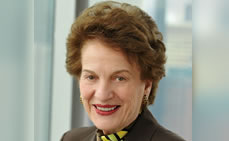Women Shaping History 2013
Judith S. Kaye: Former Chief Judge of the State of New York
 What has inspired your current career path?
What has inspired your current career path?
Maybe it’s what has driven me throughout my life: attaining the unattainable, not being negative, fierce determination to use my time and talents meaningfully.
What else would explain coming from rural Sullivan County, age 15, to Barnard College in the wilds of New York City, convinced that in the shadow of the Columbia School of Journalism I would become a great journalist, a maker and shaper of world opinion. When, upon graduation from Barnard, all I could get was a job as a social reporter, I tried a side door to news reporting — law school. Ultimately, on law school graduation I succeeded in gaining entry into to the world of “white shoe” law firms, also pretty much closed to women back in 1962.
What are some of the greatest challenges you’ve faced?
After 21 years as a practicing lawyer, the Judiciary was for me the next irresistible, but impossible, hurdle. But thank you, Mario Cuomo. His courageous appointment led to my quarter-century on New York State’s highest court (1983-2009) (the Court’s first woman judge), 15 of those years as Chief Judge of the State of New York. With mandatory retirement at age 70, I found a welcoming return to law practice with a terrific firm, Skadden Arps, where I now am.
What conclusions do you draw about me from this description of my professional life? Plainly, I enjoy facing, and overcoming, challenges to achieve objectives that are important to me.
So what are the important objectives in my life today?
Fortunately, when I reached the Court of Appeals my interests began more and more to focus on children, families, family justice. In 1988 while on the bench, I took on leadership of the Permanent Judicial Commission on Justice for Children, a position I continue to hold to this day.
What are some of the accomplishments you are most proud of?
Among the accomplishments that make me most proud are justice system reforms in the area of families and children, promoting stability, permanency and problem-solving justice. Education is of course a centerpiece. As I learned from my immigrant parents, education is the key to opportunity.
In recent years, my attention has directed toward keeping kids in school and out of courts, closing the “school-to-prison pipeline”. That is a devastating pipeline that condemns thousands upon thousands of our children to lives of violent crime and prison. Ours in effect a “last clear chance” initiative — a last chance to send our next generation on to productive, constructive lives that are the future of our nation.
Who have been the most influential mentors in your life?
Having grown up in Monticello, I have to credit a great part of my drive first to my family and then to Eleanor Roosevelt, whose example continues to inspire me. No one succeeds alone, and there are many many wonderful people along the way to thank for bringing me to this moment.
What are your goals for the future?
My wonderful “after-life” at Skadden Arps enables me to pursue a wide range of objectives, including a life in international arbitration. But way at the top I place my school-justice initiatives, keeping kids in school and out of courts, ending mass incarceration that destroys so many young families and diminishes our nation’s future.
Last year we brought together educators and judges from around the nation to collaborate on ways to close the pipeline, and we will be convening a New York State group April 11-13 at Hofstra University. Together we can do this!
The challenges are huge, and surely far outrank any I faced in my own life. But one message that still resounds for me—remembering my own early days of dismay and dejection — is that the only way to overcome challenges is to be persistent, never lose faith, stay in the game. The only way to assure failure is to stop trying. #
